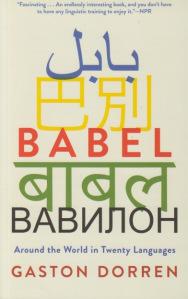 Languages are more than ways of communicating.They are ways of thinking.I figured that out with German, the first foreign language I studied.It became even more evident with Greek and undeniable with Hebrew.Beyond that, Ugaritic and other Semitic languages confirmed my suspicion.To unlock a language is to open up a new way of thinking about things.(This is one reason Trump’s isolationism was so dangerous.)Babel: Around the World in Twenty Languages, by Gaston Dorren, is an overview of twenty different ways of thinking.The book picks a prominent feature of the twenty most-spoken languages in the world.Apart from the list of what they are (in order of appearance: Vietnamese, Korean, Tamil, Turkish, Javanese, Persian, Punjabi, Japanese, Swahili, German, French, Malay, Russian, Portuguese, Bengali, Arabic, Hindi-Urdu, Spanish, Mandarin, and English) there are many other surprises.
Languages are more than ways of communicating.They are ways of thinking.I figured that out with German, the first foreign language I studied.It became even more evident with Greek and undeniable with Hebrew.Beyond that, Ugaritic and other Semitic languages confirmed my suspicion.To unlock a language is to open up a new way of thinking about things.(This is one reason Trump’s isolationism was so dangerous.)Babel: Around the World in Twenty Languages, by Gaston Dorren, is an overview of twenty different ways of thinking.The book picks a prominent feature of the twenty most-spoken languages in the world.Apart from the list of what they are (in order of appearance: Vietnamese, Korean, Tamil, Turkish, Javanese, Persian, Punjabi, Japanese, Swahili, German, French, Malay, Russian, Portuguese, Bengali, Arabic, Hindi-Urdu, Spanish, Mandarin, and English) there are many other surprises.
Many of these languages—perhaps all—are reflections of history.The histories often include intentional divisions between people.“They are not like us” thinking.Usually on the part of elites and rulers.The common person is quick to pick up the language of neighbors but those, like Trump, who hate differences, tend to rise to the top.Quite apart from that, the features of these various languages show us the many ways people have learned to convey their thoughts.Some tongues are super, even hyper-polite.Some are reserved for women.Some represent an entire continent, but notice the sheer number of Asian languages on this list.Dorren notes at one point that having a unifying Scripture, such as the Bible, often codifies a language.Religion is part of the human way of thinking.
Nowhere is this more obvious in the case of those languages that are considered divine.Arabic, as many people know, is considered the only appropriate language in which to read the Qur’an.Since languages are ways of thinking, that makes perfect sense.What really struck me the most, however, was the case of Tamil.A language of south India (many of these languages are spoken in India), Tamil is considered not only a divine language, but some adherents make it into an actual deity.In a polytheistic culture there’s no problem with adding another god.The idea that a language can be an actual divinity, however, shows once again how important it is that we try to understand one another rather than asserting one people is superior to another.The book is appropriately titled Babel, and to properly understand that it is probably necessary to learn Hebrew.
